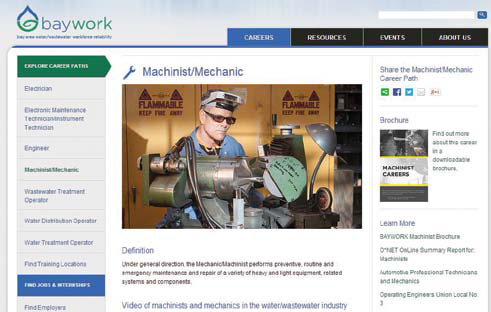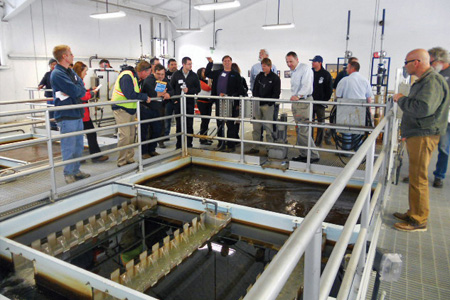Meeting The Workforce Reliability Challenge
By Cheryl Davis, manager, San Francisco Public Utilities Commission
A forward-looking utility responds to workforce retirement with a jobs program worth replicating.
Within the water and wastewater industry, asset management efforts have focused on infrastructure and equipment, even though experienced managers, engineers, and operators know that reliable operation depends on a different asset — the knowledge of prepared staff. In fact, as the industry turns to increasingly automated processes for the sake of efficiency, the level of expertise required by individual engineers and skilled-trade workers has increased. As Baby Boomers retire, insufficient numbers of qualified candidates are prepared for mission-critical trades and engineering work. Facilities, technology, equipment, and regulations also change without sufficient training for staff, and the operational reliability of water and wastewater utilities is put at risk.
In the San Francisco Bay Area, water and wastewater utilities have recognized that operational reliability depends on workforce reliability. BAYWORK, a consortium of 24 signatories (21 water and wastewater utilities, the Bay Area Community College Consortium, and Cal/Nevada American Water Works Association) works from a road map that includes four strategies:
- Develop qualified candidates for mission-critical jobs (engineers and skilled trades).
- Provide staff with the information they need to do quality work.
- Maximize the cost-effectiveness of investments through collaboration.
- Modify work processes to optimize use of staffing available.

Not just a job listing: The BAYWORK careers section offers brochures, videos,
and more.
Although some BAYWORK programs and activities are available only to water and wastewater utilities in the Bay Area, BAYWORK’s website at http://baywork. org provides information, products, and services that can be used by any component of the water and wastewater industry in any location. It also serves as a model for other utilities to construct job portals of their own, following the four basic strategies and examples described below.
Develop Qualified Candidates
In the area of candidate development, the careers component of the BAYWORK website provides background information (e.g., required credentials and skills) on mission-critical jobs as well as brochures, posters, and video interviews with engineers and skilled-trades workers. These materials can be used with youth, college students, veterans, and unemployed workers to make them aware of career opportunities available in the water and wastewater field. The jobs and internship posting component of the website can be used by any water or wastewater utility to post job openings; posting is free. BAYWORK has also created a career road map brochure (available from the website) that advises students on the steps they should take during their middle school and high school years to prepare themselves for skilled-trades positions such as electrician, electronic maintenance technician, machinist, water treatment operator, and water distribution operator.
The resources page of the BAYWORK website provides access to how-to guides and information on workshops that relate to candidate development. It contains, for example, a guide from the City of Waco on how to create a high school water training program. The events section provides PowerPoints and videos from a how-to workshop on successful internships. BAYWORK supports Bay Area vocational training opportunities (e.g., high school and community college programs) and also builds bridges between training institutions and utilities by expanding internship and apprenticeship programs.
Provide Staff With Information
BAYWORK is also addressing the issue of staff preparedness. Historically, the water industry has had the benefit of experienced employees and low staff turnover. The downside of this benefit is that many utilities have become lax in relation to documentation (e.g., standard operating procedures), technical training, staff development, and knowledge management. As Baby Boomers leave and work requirements change, few water industry employers have programs and practices in place to bring new employees up to speed on the facility and utility-specific knowledge needed. Given the spottiness of many utilities’ documentation, technical training, and knowledge management programs, even experienced workers may not know everything they need to know to use or maintain new facilities, processes, and equipment.
BAYWORK members are learning how to do better. For example, a 2012 workshop called Using Technology to Teach covered interactive e-learning, creation of video standard operating procedures, videoconferencing, and podcasts. The events component of the website includes not only information on all BAYWORK workshops, but also highlights the outstanding programs of star utilities such as Metro Vancouver and Colorado Springs Utilities.
Maximize Investments Through Collaboration
One way BAYWORK implements its commitment to costeffective investments through collaboration is through resource-sharing in the area of staff training. BAYWORK has sponsored training shared by multiple agencies in multiple locations via videoconferencing, and multi-agency training involving shared use of a single agency’s training infrastructure (e.g., structures built to provide training on how to work safely in confined spaces). Additionally, the site includes a bulletin board that allows utilities to post training opportunities that they are willing to share with others.
BAYWORK is currently sponsoring a series of Workshops on Wheels, a new approach to technical training that involves preworkshop research and allows water and wastewater staff to tour multiple sites to learn about innovations in water and wastewater treatment. For example, the North Bay workshop included site visits to plants that were treating wastewater for innovative nonpotable uses, dechlorinating wastewater effluent using engineered wetland, using new water treatment processes, and converting food waste to energy. The events section provides access to a page on each of these workshops, so that water and wastewater staff from utilities in any part of the country can view PowerPoints, videos, and surveys associated with the tour. How-to guides are another resource available to everyone; several how-to’s, for instance, relate to the use of video technology to develop standard operating procedures and staff training materials.

Interagency staff training lets plant operators see and learn from other facilities.
Modify Work Processes
In the wringing of hands about the loss of Baby Boomers, a point sometimes overlooked is that staff turnover provides an opportunity for change. Knowledge and skills are clearly being lost. On the other hand, new workers may be more open to learning to do old jobs in new ways and have a comfort level with use of computers that will help them adopt IT-related solutions. At BAYWORK we support this type of innovation. In 2010 we did research on innovations in the workplace that were helping utilities optimize their use of staffing available. These innovations included combining wastewater and water treatment classifications, use of mobile devices to create work orders on equipment maintenance, and interagency MOUs (memorandums of understanding) relating to facility maintenance. These ideas were presented in a workshop on innovations; the PowerPoints and video associated with this workshop are available in the BAYWORK events section of the resources page. Findings from the research and the workshop were combined into a white paper entitled Workforce Innovations: Doing More With Less, posted as a how-to guide.
Programs similar to BAYWORK could be successfully implemented in any region where utilities are willing to organize and collaborate. In the U.S., water and wastewater treatment services are extremely decentralized, with the result that few agencies, if any, have the resources to successfully take on these challenges alone.
 Cheryl Davis has been a manager at the San Francisco Public Utilities Commission for more than 25 years. Davis currently serves as the chair of BAYWORK and manager of the Workforce Development Initiative of SFPUC’s Water Enterprise.
Cheryl Davis has been a manager at the San Francisco Public Utilities Commission for more than 25 years. Davis currently serves as the chair of BAYWORK and manager of the Workforce Development Initiative of SFPUC’s Water Enterprise.
